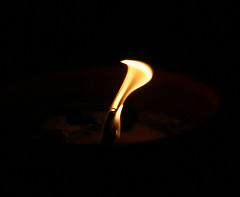Stars, keep the watch. When night is dim
One more light the bowl shall brim,
Shining beyond the frosty weather,
Bright as sun and moon together.
People, look east and sing today:
Love, the star, is on the way.

Even though I’ve been blogging on various platforms on and off for close to twenty years, it’s been a while since I made a regular practice of it. After all, it’s not one of those things one has to do. And twenty years ago I had a lot of youthful assumptions about the significance of my chronicles of daily life that I don’t have now. Now, of course, people upload pictures of their meals to Facebook — including me, sometimes — and microblogging is now a thing. Long-form blogging has sort of taken on a sepia tinge.
But now that I have my own space for it, I’m taking it up again. Because it’s not so much the chronicle as the gestalt that seems significant to me now, and the less pixellated the better.
Today is the second Sunday of Advent, a season I have loved since I first came to know it, in part because it speaks to our true condition at this time of year. Advent doesn’t pressure us to be merry. It doesn’t center itself on consumer connectedness, and if it plucks at the elbows of our priorities at all, it is to draw our attention to what’s outside the stream rather than plunge us more deeply in it. For those of us in the northern hemisphere, it gives full weight and acknowledgment to the narrowing range of sunlight as winter solstice approaches. It’s the cool, crisp shadow to the frenetic joy of the holiday season.
Every people who experiences this contraction of daylight has a tradition like Advent, that braids together a thrumming sense of anticipation with the recognition of darkness. And my characters, I reasoned, would be no different. So I fashioned for them the solstice holiday of Lightfall, complete with chant and bonfire and the Midnight Reel. And a bawdy songbook. And a cadenza in the darkness, sung in each community by a chosen voice:
This was the hour, she sang, when darkness seemed to have mastered all. When all that had been home was a country of forgetting. When the air was a burden and the ground an uneasy resting place. An hour when even the balefires were dimmed to ashes, swallowed in the wake of the poisonous inferno.
The bad times had made it so that the only possible worship was to make a virtue of loss: in the long generations since, every people had crept their way out of darkness little by little, but no one ever forgot that the love of wisdom was found in making offering. And there was always something one could give over. To make an offering, even of defeat and loss, was to kindle a light. All darkness apprehends its own ending.
From that moment of offering in the darkness, the light opens out again, little by little: both literally, in the reel of the earth’s axis, and figuratively, as we find our way and recover our lives, our breath, our joy. In Ryswyck, events drive on and the light contracts to its deepest dark; and from that moment hope and possibility widen out again, invisible at first but gathering its strength.
It’s the days after winter solstice that I find my creative resurgence, after the losses of the fall. And this is the sort of image I steel myself with when reading the news headlines, when workday business closes after sunset, when I contemplate the uncertainties of my own life and the lives of my communities and the fruits of my daily efforts.
All darkness apprehends its own ending.
